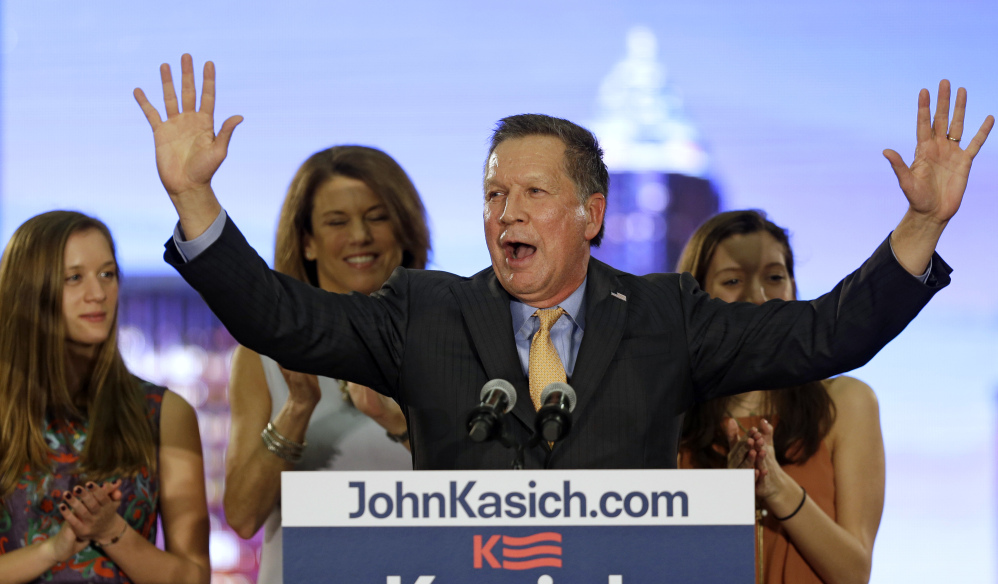BEREA, Ohio — Gov. John Kasich won his home state’s winner-take-all primary on Tuesday, rescuing his campaign for the presidency and becoming the last Republican candidate acceptable to the party’s nerve-wracked establishment.
“Tomorrow, I’m going to Philadelphia,” he said at a victory party at Baldwin Wallace University in Cleveland’s suburbs. “We’re going to go all the way to Cleveland and secure the Republican nomination.”
It was Kasich’s 24th consecutive win in Ohio politics; to assure it, he stormed the state for five of the six days after his close third place showing in Michigan. Kasich built a small lead in public polls, while reporters reminded him of his promise to “roll up the carpet” if he lost Ohio.
In the end, it was close but decisive. Kasich dominated Trump in the cities and suburbs of Cleveland, Columbus, and Cincinnati. Trump drew closer in areas where the economy had been slow to recover from the 2008 recession, and defeated Kasich in the southeastern counties where manufacturing and coal jobs had been disappearing since the 1970s.
Kasich’s personal popularity in the state allowed him to overcome hurdles that had stopped him elsewhere. In exit polls, Kasich won 31 percent of the vote among “very conservative” Republicans, a group in which he had averaged just 5 percent support across all contests. Over half the Republican voters in Ohio said they would not support Trump in a general election, the highest of any March 15 state.
Kasich and Trump were both helped by Democrats who crossed into the Republican primary, some of them to stop the national front-runner and some to aid him. But Kasich ran strongest with those voters, winning 56 percent support to Trump’s 41 percent.
In a campaign memo Tuesday night, Kasich strategist John Weaver pointed to internal data that found Rubio’s supporters would break to the Ohio governor by a 3-1 margin. “With the electoral map shifting significantly in our favor, Gov. Kasich is positioned to accumulate a large share of the almost 1,000 remaining delegates,” he said.
Kasich, who trails Cruz in cash on hand, told The Washington Post this week that “the fundraising side of this thing” would improve after an Ohio win.
The Kasich crossover voters Tuesday night included people like Scott Ross, 63, a retired businessman in Olmstead Township who only decided in the last week to back his governor.
“In any election, you want to have the most competent people running,” he explained. “He deserves a chance to get his message to the rest of the country. More people should hear it.”
In his victory speech, Kasich thanked crossover voters, crediting them for rejecting “socialism” in the Democratic Party.
“I want to thank them for coming over in this election and putting their confidence in me, because I think we all know that conservative principles can work, and common sense can work,” he said.
Before 2016, the idea of Democrats backing Kasich to save the Republican Party from its extreme would have been risible. A deeply conservative member of the House, Kasich briefly hosted a Fox News talk show, worked at Lehman Brothers, then returned to Ohio to win the governor’s mansion in the tea party wave.
But Kasich’s image since then, molded by both reality and his campaign team, had set him apart. Kasich, one of relatively few Republican governors to accept the Medicaid expansion of the Affordable Care Act, ended up besting rivals who hadn’t – and Rubio, who worked in the Senate to repeal it.
On the stump, and in his victory speech, Kasich spent more time talking about togetherness than doctrinaire conservatism. In his first moment of triumph of the primaries, he even joked along with a heckler who shouted Trump’s name.
“When you went to college in the 1970s, you appreciate a good protest,” said Kasich.
Kasich’s Wednesday morning trip to the Philadelphia suburbs was the start of what his campaign expected to be a run through the later and more moderate primaries, like Pennsylvania, and in heretofore-ignored places like Delaware, Connecticut and Wisconsin.
“I think the issue in Pennsylvania is going to be who can beat Hillary Clinton,” said former congressman Bob Walker, Kasich’s Pennsylvania chairman.
Send questions/comments to the editors.



Success. Please wait for the page to reload. If the page does not reload within 5 seconds, please refresh the page.
Enter your email and password to access comments.
Hi, to comment on stories you must . This profile is in addition to your subscription and website login.
Already have a commenting profile? .
Invalid username/password.
Please check your email to confirm and complete your registration.
Only subscribers are eligible to post comments. Please subscribe or login first for digital access. Here’s why.
Use the form below to reset your password. When you've submitted your account email, we will send an email with a reset code.